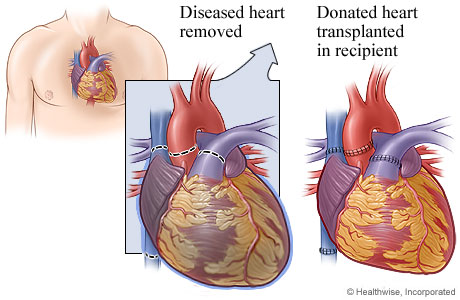Heart transplant surgery: Overview
A heart transplant is a procedure in which a surgeon removes a diseased heart and replaces it with a donor heart. During a heart transplant, a mechanical pump circulates blood through the body while the surgeon removes the diseased heart and replaces it with a healthy heart from a recently deceased donor.
The surgeon connects the donor heart to the major blood vessels and hooks the heart up to wires that temporarily control the heartbeat. The procedure takes several hours.
To prevent the body from rejecting the donor heart, your surgeon will give you powerful drugs (immunosuppressants) right after surgery. You must continue to take them.
Why is heart transplant surgery done?
A heart transplant is an option when the heart no longer works well enough and a person is at risk of dying. A heart transplant may be considered when a person has severe heart disease and is likely to benefit most from a donor heart. A person might be a candidate for a transplant when any of these conditions are true:
- The person has end-stage heart failure, ischemic heart disease, cardiomyopathy, or congenital heart disease.
- The person has a low chance of living as long as 1 year without a heart transplant.
- The person has no other serious medical conditions that would reduce life expectancy.
- The doctor strongly expects that a heart transplant will increase survival and improve the person's quality of life.
At some centers, transplant candidates must demonstrate that they have quit smoking and/or overusing alcohol for a period of time (such as 4 to 6 months) before they are considered for placement on a transplant waiting list.
Heart transplant

For a heart transplant, the diseased heart is removed and replaced with the donated heart. During the surgery, a mechanical pump moves blood through the body.
After a heart transplant: When to call
Call 911 anytime you think you may need emergency care. For example, call if:
- You passed out (lost consciousness).
- You have severe trouble breathing.
- You have sudden chest pain and shortness of breath, or you cough up blood.
- You have severe pain in your chest.
- You have symptoms of a stroke. These may include:
- Sudden numbness, tingling, weakness, or loss of movement in your face, arm, or leg, especially on only one side of your body.
- Sudden vision changes.
- Sudden trouble speaking.
- Sudden confusion or trouble understanding simple statements.
- Sudden problems with walking or balance.
- A sudden, severe headache that is different from past headaches.
- You have symptoms of a heart attack. These may include:
- Chest pain or pressure, or a strange feeling in the chest.
- Sweating.
- Shortness of breath.
- Nausea or vomiting.
- Pain, pressure, or a strange feeling in the back, neck, jaw, or upper belly or in one or both shoulders or arms.
- Lightheadedness or sudden weakness.
- A fast or irregular heartbeat.
Call your doctor now or seek immediate medical care if:
- You have pain that does not get better after you take pain medicine.
- You have loose stitches, or your incision comes open.
- You are bleeding a lot from the incision.
- You have signs of infection, such as:
- Increased pain, swelling, warmth, or redness.
- Red streaks leading from the incision.
- Pus draining from the incision.
- A fever.
- You have signs of a blood clot, such as:
- Pain in your calf, back of the knee, thigh, or groin.
- Redness and swelling in your leg or groin.
- Your heartbeat feels very fast, skips beats, or flutters.
- You have symptoms of heart failure, such as:
- Swelling in your legs, ankles, or feet.
- Sudden weight gain, such as more than 2 to 3 pounds in a day or 5 pounds in a week. (Your doctor may suggest a different range of weight gain.)
- You are sick to your stomach or cannot keep fluids down.
Watch closely for changes in your health, and be sure to contact your doctor if:
- You do not get better as expected.
©2011-2025 Healthwise, Incorporated
